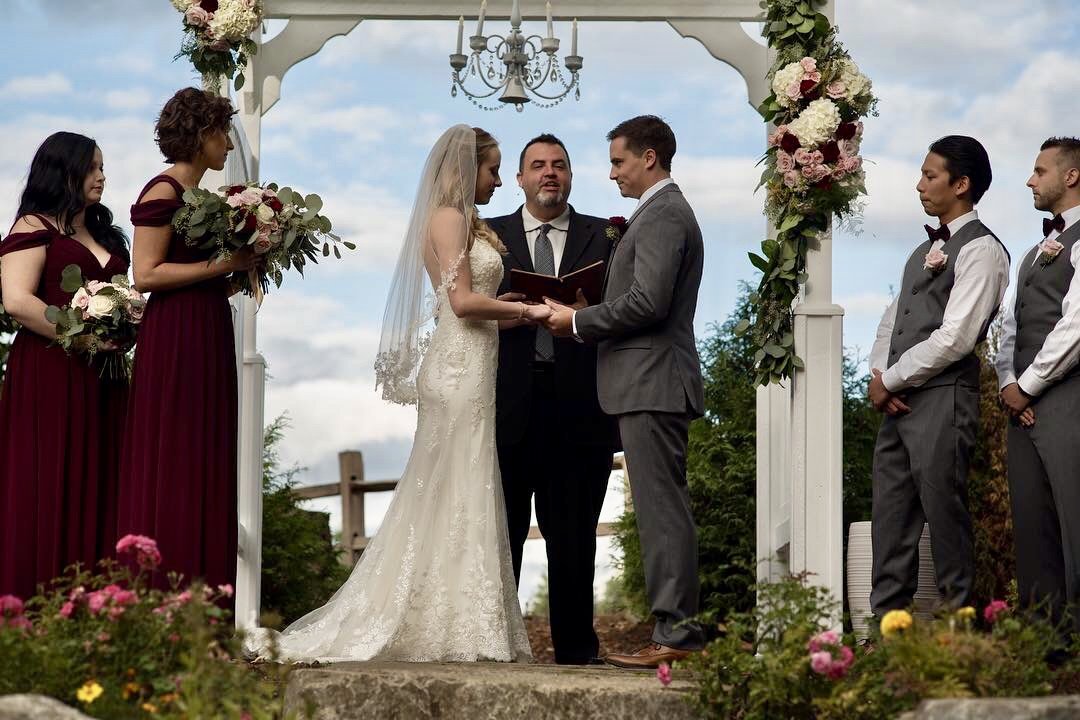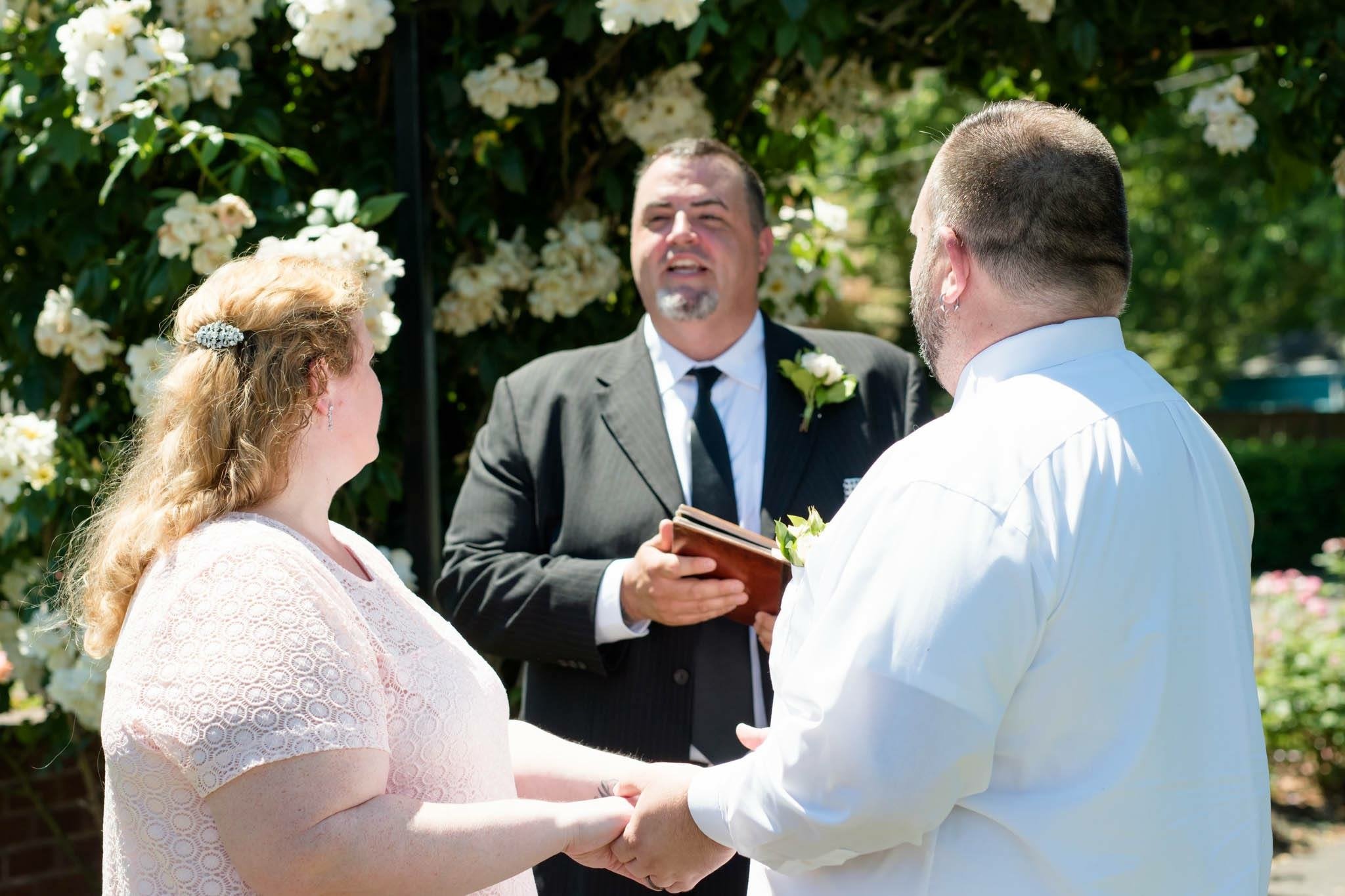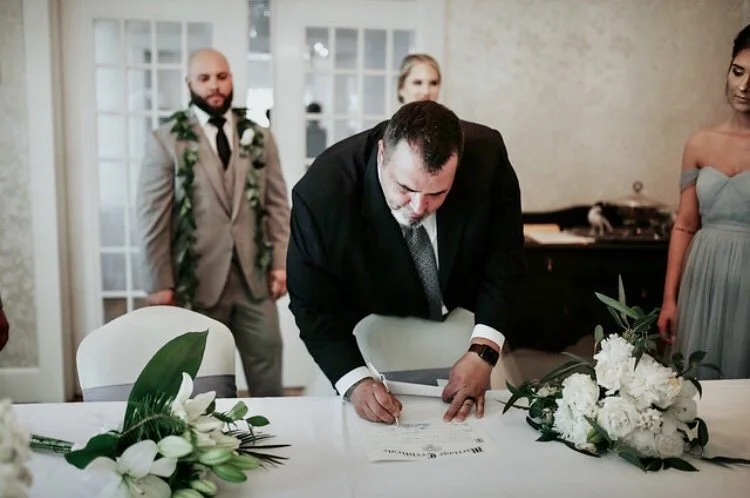Just when you thought you had your whole wedding figured out, your officiant asked the most important question you forgot about, “how do you want to do your vows?” My God, as if your plate wasn’t full enough, now you and the love of your life need to sit down and figure out what you want to do when it comes to the most important part of your wedding ceremony (besides, of course, actually being pronounced married - duh).
So what do you do? What are vows, and why are they so significant? What if you’re too nervous or too emotional? Do you even have to do vows in your ceremony?
Whoa there! Take a deep breath, and I’ll help you understand and give you some pointers.
Take a deep breath
Now, first things first. I need you to relax and not stress out. When it comes to the actual ceremony, this should be one of the most fun, and loving things you decide on. This is, afterall, your chance to speak from the heart and tell your beloved everything you want to say to them on your BIG day. And yes, you’ll do it in front of everyone! Aaahhh!
I vow to not freak out
Let’s take a look at what vows are, because there’s lots of definitions, and misconceptions, about vows, and I want you to have a better understanding of why they’re in a wedding ceremony.
Wedding vows have been around since the time of the Roman Empire. Back then, lower class citizens had their marriages outside of “the church”. These types of marriages were usually arranged, and dealt with property, and what belongs to who now. They would promise each other what they would bring to the relationship, and then a property rights document would be signed. But you’re not a piece of property, so let’s move on.
Fast forward to the mid-1500’s and we have the first recorded marriage vows from the Church of England. It was those vows, that our modern day “traditional” vow is based off of. Today it talks about being there through good times and bad, for richer or poorer, in sickness and in health... sound familiar?
Sidenote: Because I do still occasionally get brides who ask about the word “obey” in traditional vows: In the 11 years I’ve done weddings, I’ve never included that in a traditional vow, and never will. In fact, in 1922 the Episcopal Church voted to have that removed from traditional wedding vows. (See? Again, you’re not a piece of property!)
In present day weddings, couples now have so many more choices, it can make your head spin. Not only do you have the choice between doing traditional vows or writing your own, but within the category of traditional vows, you have a plethora of even more options! We’ll discuss that in a little bit. For now, back to vows as a whole!
Marriage vows today are meant to signify what you and your loved one want to bring to the marriage, and what you’ll strive to do to make your marriage a successful one. They are vows, swearing to one another, that you won’t break them. In other words, they’re promises you intend to keep. Plain and simple. You promise to stick together no matter what. You’re not looking for an easy out. You’re in this together, and will support each other in every endeavor, situation, or circumstance.
It’s a tradition
Now that we’ve got the history lesson out of the way, let’s discuss the options you have when it comes to vows.
Like I mentioned earlier, traditional vows have been around for a very long time. When you hear someone say “traditional vows”, all that means is you’re using the standard officiant-says-and-you-repeat method.
Traditional vows are fairly simple, in regards to what you’re going to say and how you’re going to say it. Someone else has already written them out, and you’re now copying whatever your officiant is saying. And don’t worry, most officiants I know (including me) break the vow up in to easy, bite-sized wordings, so you won’t get flustered and forget what to say.
Now, with traditional vows, there are so many options nowadays, it’s can be overwhelming. For example: when a couple hires me as their wedding officiant, I provide several, helpful resource documents to help them make decisions about their ceremony. One of the documents I provide is a “Traditional Vows” document. In that document I list out 25 variations of traditional vows. Some are longer, some are shorter. Some are more religious, some are more romantic, some are more modern, etc.
Why do I do this? Because most couples don’t have the time to sift through all the minutia of Pinterest. There’s hundreds, if not thousands of examples online!!
Traditional vows, while not as popular as the other option these days, can be great for couples who just don’t have the time to sit down and write their own vows, or they want something easy, or perhaps they don’t want to get too emotional, or maybe they classify themselves as introverts.
That’s why there are options, because not every couple is the same. And isn’t it great that you get to choose whichever vow is the most comfortable for you?
I’m more of a touchy-feely kinda person
Now let’s talk about the most popular option that’s out there today - writing your own vows. This is a big step, are you sure this is the route for you both? If so, read on.
The number one thing to keep in mind when writing your own personal statements is this: give yourself enough time and be prepared that you’re going to change your mind about what you want to say at least a hundred times.
Unless you’re gifted with the talent of waxing on eloquently on paper, this could be a difficult task for you, but don’t let it be. Take a deep breath, and write from the heart. That’s right... write it from deep within your love for one another. Pretty simple, right?
What I tell couples that I’m helping marry is this: write down exactly what you want to say to them on one of the most important days of your life. Pretend you have one shot at telling someone what they mean to you, and how much you’re going to promise to make this marriage work, no matter the cost.
Now, there are a couple of misconceptions out there about writing vows, and we need to dispel these myths.
1.) You do not need to memorize your vows.
I repeat: please, for the love of God, do not try and memorize your vows. It has never worked, it won’t work, and it never will work. You are going to have too much stuff going on the day of your wedding, and the last thing you’re going to need to do is try to remember what you were going to say to one another.
I know, you just saw the latest Rom-Com, and in the movie they said all these amazing things to each other, while holding hands, and looking deeply in to each other eyes. But that’s not reality. Those are actors, who’ve practiced those lines for weeks. You will be emotional, and forgetful.
Write them down! I’ve seen everything from vow booklets, to post cards, to phones, to even on the palm of the grooms hand. Just write it down, so you can effectively communicate what it is you want to say to each other.
2.) Vows do not need to be the same length.
I realize this is shocking to some, and some officiants may disagree with me, but let me share why I say this:
In my 11 years of experience, I’ve noticed one big trend, most couples are not the same when it comes writing their feelings down. One person will write about 3 sentences, while the other may write 3 pages. Now, I’m exaggerating a tad, but you get my point.
I never want to force the 3 sentence person to write more, because it won’t be heartfelt. And I don’t want to force the person who wrote 3 pages to whittle it down to 3 sentences, that’s not fair.
Write what you’re going to write. Know that it’s going to be amazing, emotional, and loving. Be happy with what you came up with, and move on. Trust me, there won’t be a dry eye in the place!
Writing your own vows can offer you a rather unique opportunity in your ceremony. Think about it - no one in human history will ever say exactly what you say during their wedding ceremony. Guests tend to lean in more when they realize the couple has written their own vows, but make sure you have an extra tissue when you say them!
Nervous Nelly and Norman
For a select few of you, you may be breaking out in hives right now just thinking about having to speak in front of others, and I realize this. So what do we do?
Well, if you think you just can’t do it, no matter how much anxiety medication you take, no matter how many shots you slam before the wedding, you just can’t fathom the idea of saying anything to one another with all eyes on you, there is one other solution. It’s not typical, but it is available. There is the option of bypassing the wedding vows all together.
Now, in all the years I’ve done this, there has only been a handful that have chosen this option, but it is available to you. The key to remember, and remind others is this: it is not required by law for you to say a wedding vow. It is a part of tradition.
Meaning this: you can still have a wedding ceremony, sign the license, and be legally married without saying vows.
This is an option for those in extreme situations where either one or both are so nervous, or introverted, or physically, emotionally, or mentally unable to do it. They just can’t get the words out.
Believe it or not, there are couples like this. Last year I married a very sweet couple, who had been together since high school. The groom not only suffered deeply from anxiety, but was also on the autism spectrum. The only words he could muster during the ceremony was the “I do” part. We still had a fun, amazing ceremony, but slightly went off the typical route for their wedding. And guess what, no one noticed or cared. The guests were elated to see them get married with or without wedding vows.
So, if you feel you can’t muster up the strength to say vows, than tell your significant other, and your officiant. We can work around that!
I vow this is the end
Let me say this about vows, in general: no matter which way you decide to go, make sure it’s perfect for the both of you. Don’t decide to go one way over another because your best friend or parents tell you it’ll be better. You and your future spouse need to make this decision together, and you need to be comfortable in that decision. It’s ok to change your mind a million times.
Remember, this is your wedding! Be confident in your choice, and be relaxed when planning it out. There’s no right or wrong way to do vows. Ultimately, the only thing that matters is that you both know you love each other, no matter what direction you go with vows, that won’t change. Have fun, and if you need additional help, ask your officiant. If you don’t have one, contact me so we can start planning the perfect ceremony for you both.







